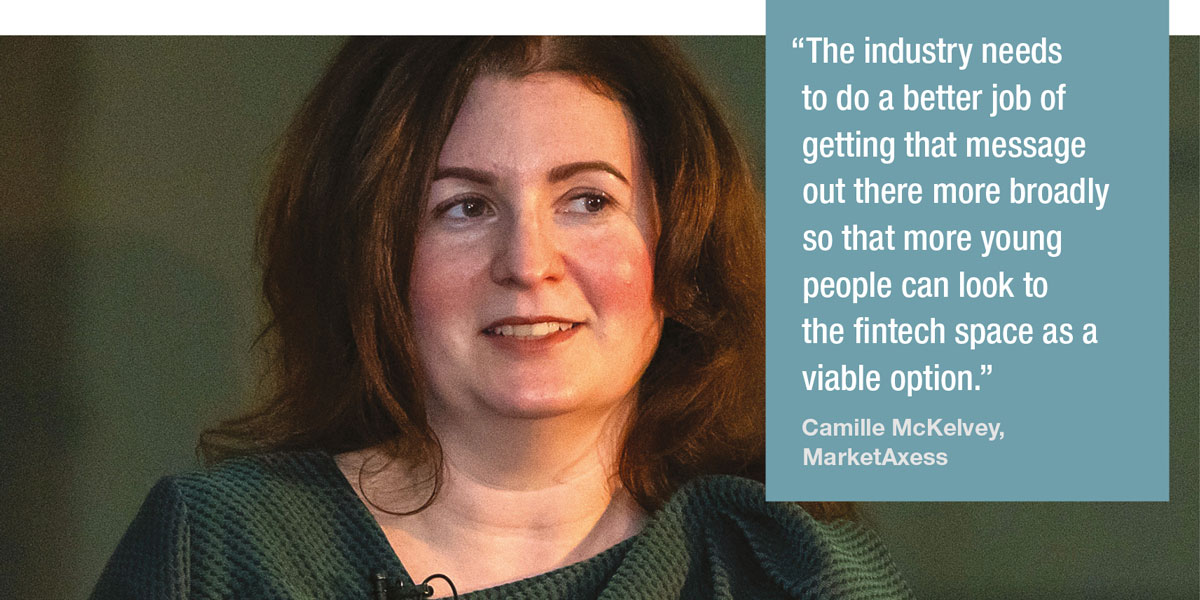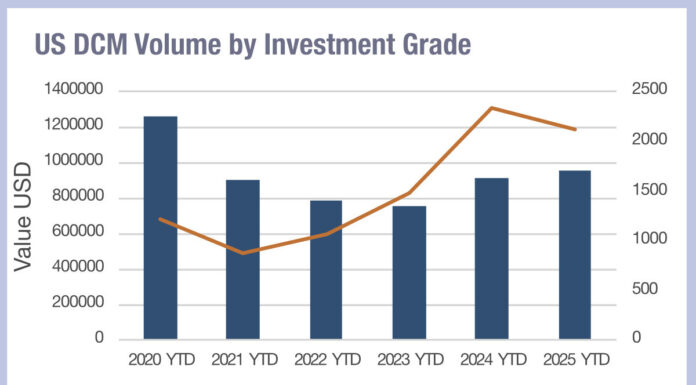MarketAxess’s head of business development for post-trade, Camille McKelvey discusses her personal journey, and the path to leadership for women in capital markets.
Camille McKelvey is the head of business development for MarketAxess’s post-trade business, with a specific focus on repo and collateral markets as well as promoting automation in the financing market. Before joining MarketAxess, Camille worked for ten years in investment banking. Camille is a founding member of MarketAxess’s Women at MarketAxess Network, ICMA’s Women’s Network, and was also instrumental in MarketAxess signing up to the UN’s Women’s Empowerment Principles which guide businesses on how to promote gender equality. She’s a fierce advocate for gender equity in the workplace and a trailblazer for many initiatives that have helped to champion women in the workplace across finance and technology.
What inspired and motivated you to pursue a career in the fintech sector at a time when there were few female role models at high levels in the industry?
Having already spent 10 years at investment banks prior to joining MarketAxess, I did not have a gendered view on making the move into fintech. Ten years ago when I joined MarketAxess, I started to get much more actively involved in D&I initiatives and started to truly understand the challenges.
In 2014, I became a founder and committee member of the ICMA Women’s Network. I found this to be a fantastic way to involve women across the industry and connect them through our network. Although this network is not specific to fintech, it was an opportunity for women to come together at all levels of their careers and form strong bonds that have persisted beyond the scope of this group.
When you first entered the financial services sector, what was it like and what obstacles or challenges did you face as a woman?
I am a confident person and I have never had an issue with speaking up and making my voice heard, but there have been times where that confidence has been truly knocked. For example, during a media training session several years ago, I was told that I should lower my voice and watch videos of Margaret Thatcher pre- and post- her serving as the Prime Minister to see how she adapted her voice. I was told I should replicate that, otherwise I would never be successful in my endeavours.
Today, and as a rational person, I can see now that this is a ridiculous statement, but at the time this had an enormous impact. It took many years for me to realise that I should not have to adapt the way that I speak to accommodate others, and that the content of what I am saying should be sufficient; not the tone of my voice. Speaking out about this and sharing this anecdote made me realise just how bad that was.
How is the fintech landscape different for women today than when you started out?
There are many initiatives now that encourage females to study STEM subjects and explore a career in fintech. There are also more routes into this business such as apprenticeship schemes which means that the traditional educational paths are no longer the only road to take. Today, there are efforts to grow and develop talent, and women are a key part of this.
Being super technical is not a requirement to have a successful career in fintech – there are opportunities across sales, marketing, finance, etc. Despite these changes, the industry needs to do a better job of getting that message out there more broadly so that more young people can look to the fintech space as a viable option.
What do you see as the biggest opportunities for innovation in fintech right now? How are you positioning post-trade for future growth opportunities?
The technology that we have available to us today is remarkable and can help the market to become much more efficient than ever before. We live in a world where you can trade a bond today, but don’t take delivery of it for another two days. Although this is changing with initiatives such as T+1 and DLT, there is a real opportunity for the market to move to real-time atomic settlement over time.
Data is the biggest opportunity right now and it is at the centre of innovation. The use of AI is dramatically changing the landscape and driving change in trading strategies based on information that the market would not have historically had access to. In the post-trade space, it is no different when it comes to data and AI. AI is helping our clients at MarketAxess to catch errors in their transaction reporting, and it’s becoming the norm, which is a huge value-add.
Repo is also a real growth area within post-trade and we are growing out our global community of sell- and buy-side firms using our platform to confirm trade details in near real-time. When you think about the trillions of dollars traded in this market daily, the potential to automate has significant benefits at an individual client level, but also more broadly across the industry. A well-functioning repo market is key to a well-functioning cash market.
Why is it important that companies have gender diversity and women’s perspectives represented at the board level?
Having different views at the table is important. If everyone looks like you and thinks like you then invariably you all come up with the same answer and may not challenge each other. Different approaches and opinions are key at all levels of an organisation. Specifically at a board level, and for me, ‘if you can’t see it, you can’t be it.’ These voices must be at the table.
I often sit on panels where I am the only woman featured. My hope is that one day we can get to a stage that there is no comment about which gender someone is but rather the content of what they are saying. I often speak publicly about our business, but it frequently comes back to gender rather than the content of what is being discussed.
Female representation within the fintech and larger financial services sectors is growing, and I believe that this conversation will not be so relevant in the next generation as opportunities to enter and grow within financial services will be less gendered (I hope!).
What is your leadership philosophy when it comes to managing your team and how has your approach evolved over your career?
Having the right training is key to being a good leader. Listening and working through issues, and helping your team come to the right conclusion rather than providing the answers are essential to being a successful manager. In my first management role, I was in my mid-twenties, and I had not had any training, I was just an individual contributor who was then promoted to lead a team. Over the years, I have spent a lot of time working on my leadership style and positively influencing my team or those who I work with.
As a leader and manager, I noticed that many organisations did not have a network for women leaders to come together, which is why I was a founding member of two women’s organisations, both internally and externally. At MarketAxess, I was a founder of the Women at MarketAxess Network, which creates a network for women to help grow relationships, develop skills, and build the optimal workplace. At ICMA, I helped found the ICMA Women’s Network which also focuses on building networks for women in financial services and now has over 3,000 members.
Outside of work, what passions or causes are most important to you and how do you make time to pursue those?
I am passionate about the Smart Works charity which helps women to get into the workforce. At the heart of Smart Works, there’s a dressing and coaching service designed to help their clients to be the best version of themselves. The women who come to Smart Works are referred from Job Centres, mental health charities, women’s refuges, homeless shelters, the prison service, care service and youth organisations.
©Markets Media Europe 2023
©Markets Media Europe 2025













